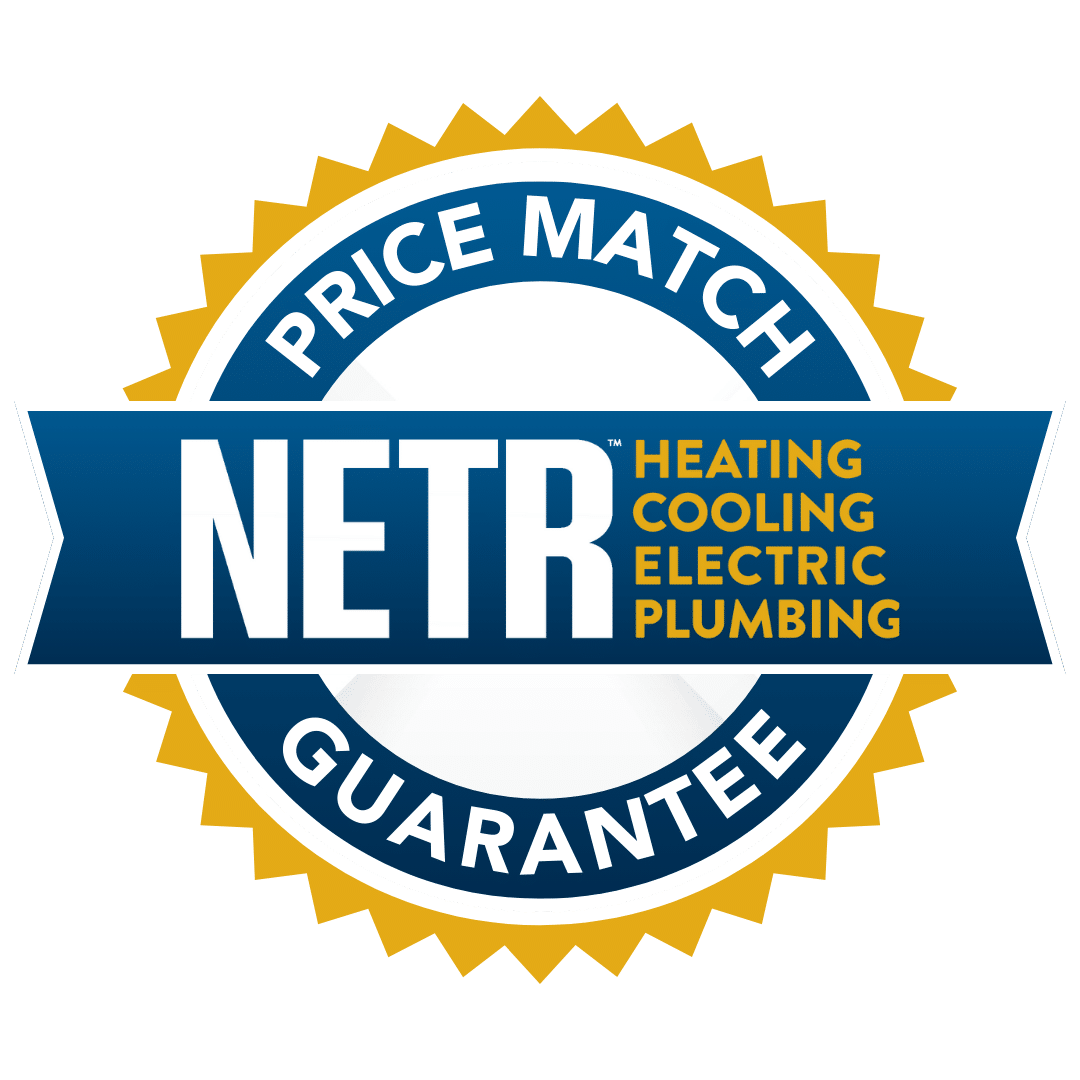Winter Heating Tips for First-Time Ductless HVAC Owners
Is this your first winter season in Massachusetts as the owner of a ductless mini split heater? You’re not alone. Many new ductless system owners are unfamiliar with what to expect from their system and how to ensure it runs as efficiently and cost-effectively as possible.
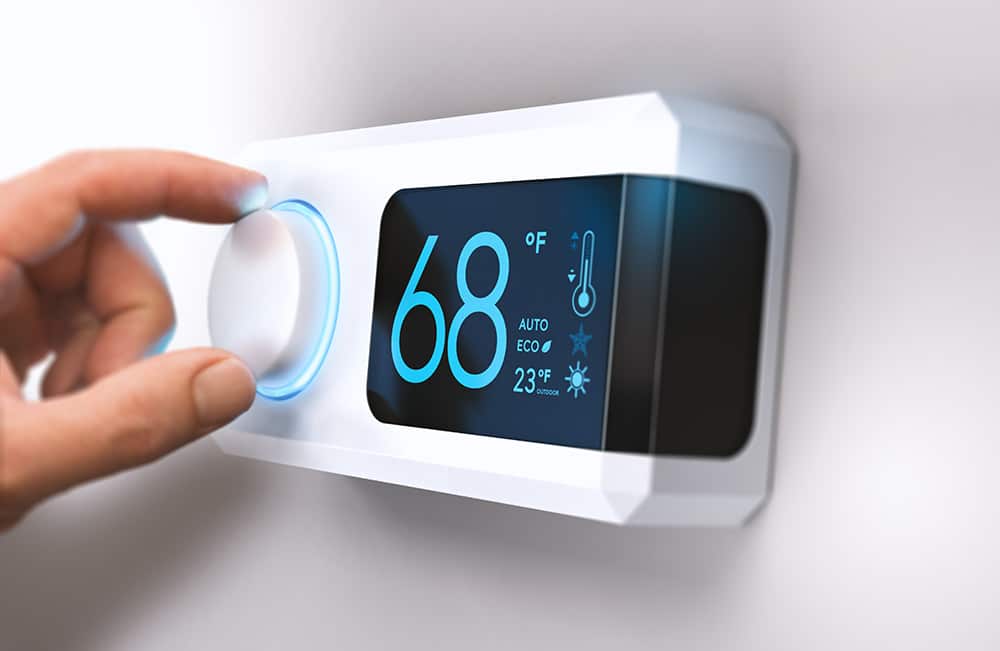
Top 5 Benefits of Having an Electrical Inspection on Your Old Boston Home
One of the most important systems in any home is its electrical system. It’s responsible for providing power to every room in your house and is the cornerstone of your home’s functionality. Electrical wiring runs through each of your walls, the floors, and the ceiling to provide electricity to overhead lights, wall outlets, appliances, and more. Any interruption in this system can be inconvenient at best and may completely destroy your electrical wiring at worst.
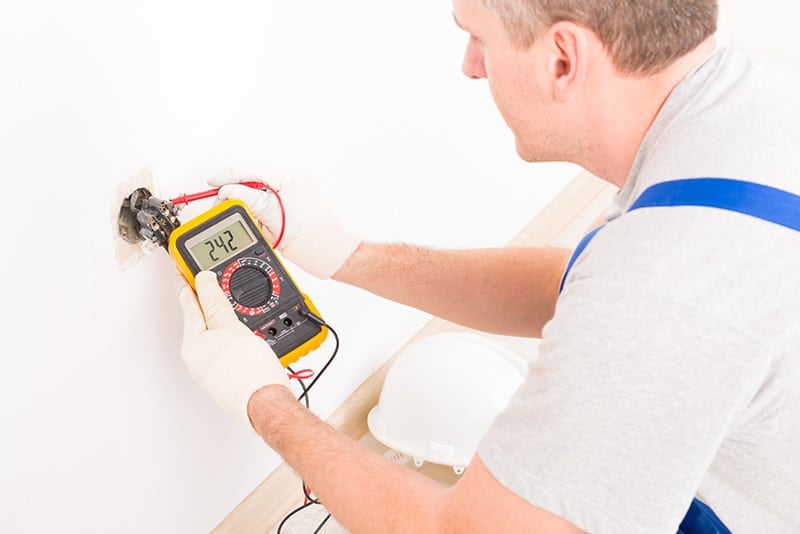
5 DIY HVAC Repairs Gone Wrong
Many homeowners look for ways to save money on their household expenses, especially when it comes to big ticket items like the installation, repair, and maintenance of an HVAC system. Sometimes, homeowners are tempted to do the work themselves, assuming that it’s easy enough with the help of an instructional YouTube video and parts purchased online or at a hardware store.
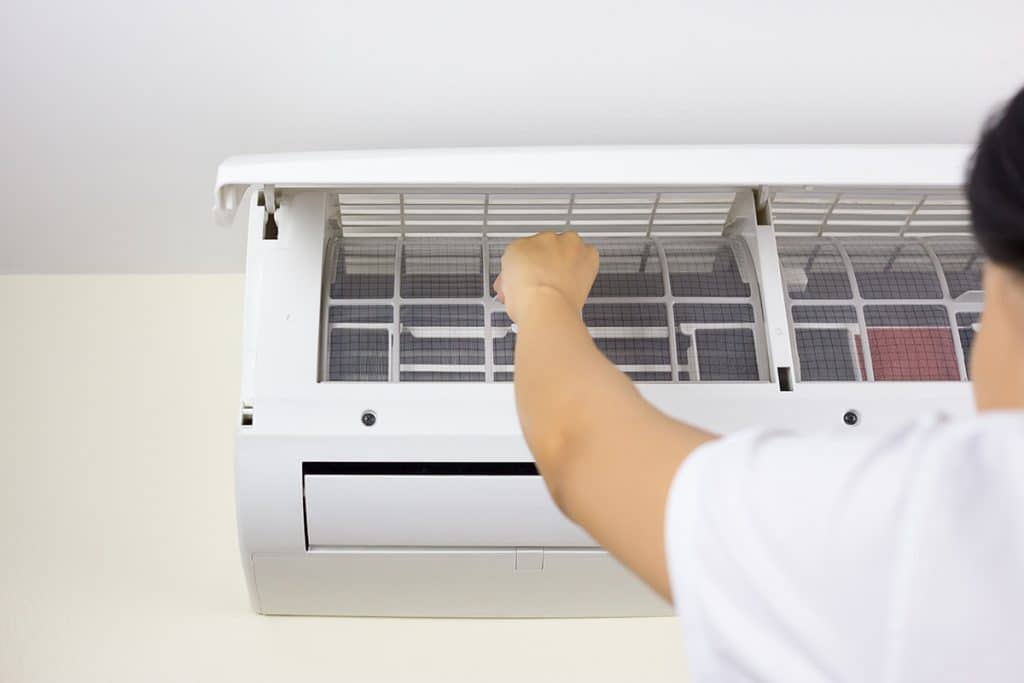
How to Improve Office Ventilation in the Winter
Indoor air quality is an important consideration in work productivity and efficiency. Poor air quality can slow office workers down, making them feel sick, tired, or unable to think clearly. Ventilation is hard to come by during the winter, when office windows and doors are closed to protect employees from the frigid Massachusetts air.
Here’s what employers should know about toxic office air in the winter and they can do about it.
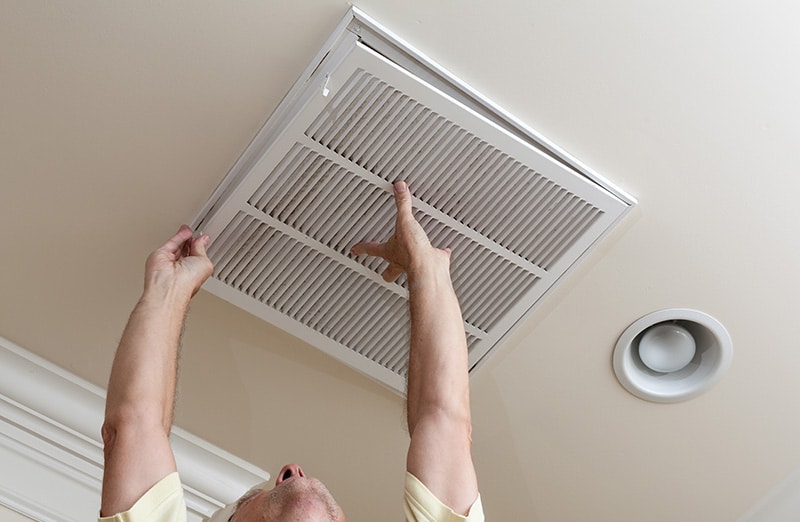
Ductless Deep Cleaning for Spring
Your HVAC system is a significant contributor to the quality of your air, especially in spring when the number of allergens in the air is much higher.
The Boston Globe reports that allergy season in Massachusetts is typically between May and August, and the Asthma and Allergy Foundation of America lists Springfield, Massachusetts as one of the top 10 worst cities in America for allergy sufferers.
This means that keeping your ductless AC clean is an important part of ensuring your air is healthy and your air conditioning works properly, but it’s something a lot of people don’t prioritize. With COVID-19 now a part of daily life, making sure your respiratory health is in peak shape is also high on the list this summer.
Unfortunately, self-cleaning HVAC technology doesn’t yet exist and chances are, you’re not getting the clean you need from simply maintaining your filters. A professional deep cleaning removes far more waste from your system and keeps it running smoothly throughout the season.
Here’s how we deep clean your ductless unit for spring or any other time of the year:
Install a Splash Guard
Before cleaning your ductless heat pump, we put up a protective splash guard called a bib to prevent dirt, debris, cleaners, and water from splashing onto your walls or floor. This mixture contains harmful particulates like fungi and bacteria, according to Time Magazine. We collect this dirty water in a receptacle that can be easily washed down the drain.
Apply Advanced Formulated Foaming Cleaner to the Unit’s Coils
Next, we disassemble your unit and apply a high-tech foaming cleaner to the coils. The cleaner is formulated to begin breaking down oil and dirt immediately and only requires a short amount of time to start working.

The Hydrokleen system uses AerisGuard cleaners that have been specifically designed to clean and protect ductless HVAC systems. These non-toxic, multi-enzyme cleaners are made to break down organic waste and detach it from the coil’s surface so it can be easily sprayed away. Without these formulas, it is much more difficult to remove hard, caked-on debris, even with aggressive scrubbing.
Pressure Wash the Unit
Once the AerisGuard foaming cleaner has been working for a few minutes, our experienced HVAC technicians will begin to pressure wash the unit’s coils. This physically flushes water through the system to remove mold, mildew, dust, bacteria, and virus particles that may be hiding deep within.
This type of cleaning can’t be achieved by simply removing and rinsing your ductless filters; it requires professional service from a trained technician. It is recommended that you clean the filters yourself every four to six weeks and have a deep cleaning done at least annually if not seasonally before spring and again in the fall.
Clean the Chassis, Barrel Fan, and Other Components
Next, other parts of your ductless air conditioner will be cleaned, including the chassis, the barrel fan, the louvres, the drain pain, and all other components.
Often, dirt and debris will build up on the back of the fan, giving the illusion that the system is cleaner than it is. Meanwhile, the dirty fan contaminates all of the air that passes through it and into your home. It also reduces the overall air velocity, causing the unit to become inefficient at cooling and increasing your energy bills. Energy.gov reports that your air conditioner can become 5% to 15% less effective at cooling your home if the filters are clogged.
The Hydrokleen system allows us to quickly and easily clean these parts that you may not be able to reach on your own. A deep cleaning not only improves your air quality but also helps you save money on your electric costs by significantly reducing the workload on your unit.
Apply a Protective Coating to the Coils
After the HVAC system has been cleaned, we apply a specially formulated AerisGuard protectant to your air conditioner’s components to create a biostatic layer that discourages the buildup of debris on the unit’s coils. This helps to improve air quality and control odors, because waste that would ordinarily build up and cause a musty, mildewy smell is no longer able to do so.
AerisGuard products are non-acidic, helping to protect the longevity of your system over time. Other cleaners that contain harsh corrosives can damage the coils and other ductless system components, requiring you to replace or repair them sooner.
Reassemble the Ductless Unit
After our technicians have serviced your unit, it will be reassembled and tested to ensure that it is working properly for both heating and cooling. Our HVAC techs don’t leave your home until we know that everything is in order and you won’t have any difficulty starting your system back up after the deep clean.
Check the Outside Compressor
We’ll also check the outdoor compressor of your unit to ensure that there is no vegetation growing over it. We’ll look for signs of damage and make sure that there isn’t any ice buildup that could be impacting your HVAC system’s ability to cool your home. Whether you have a single outdoor unit or a multi-zoned system, our technicians are capable of providing you with expert service.
Contact N.E.T.R. Inc. Today to Schedule Your Ductless Deep Cleaning for Spring
If you deep clean your home every spring, don’t forget about your ductless HVAC unit. In fact, if all you’re able to deep clean is your HVAC system this spring, your respiratory health and utility bills will thank you for it. Contact N.E.T.R., Inc. today to schedule your HydroKleen appointment by calling 781.933.NETR (6387). We provide ductless deep cleaning for both residential homeowners and commercial businesses and are available now to assist you.
Download Your Massachusetts COOL SMART Rebate Application
NETR can help you get the maximum Mass Save rebate
ENTER YOUR INFO IN THE FORM TO GET YOUR APPLICATION
Mass Save® is an initiative sponsored by Massachusetts’ gas and electric utilities and energy efficiency service providers, including Columbia Gas of Massachusetts, The Berkshire Gas Company, Cape Light Compact, Eversource, National Grid, Liberty Utilities and Unitil.
The sponsors of Mass Save work with the Massachusetts Department of Energy Resources to provide a wide range of services, incentives, trainings, and information promoting energy efficiency that help residents and businesses manage energy use and related costs.
We’ve guided hundreds of Boston area homeowners through the process of successfully cashing in on this program, so once you get your application, please don’t forget, we’re here to help you in any way we can.
If any of these sounds like your situation, get our free guide to learn more about your options:
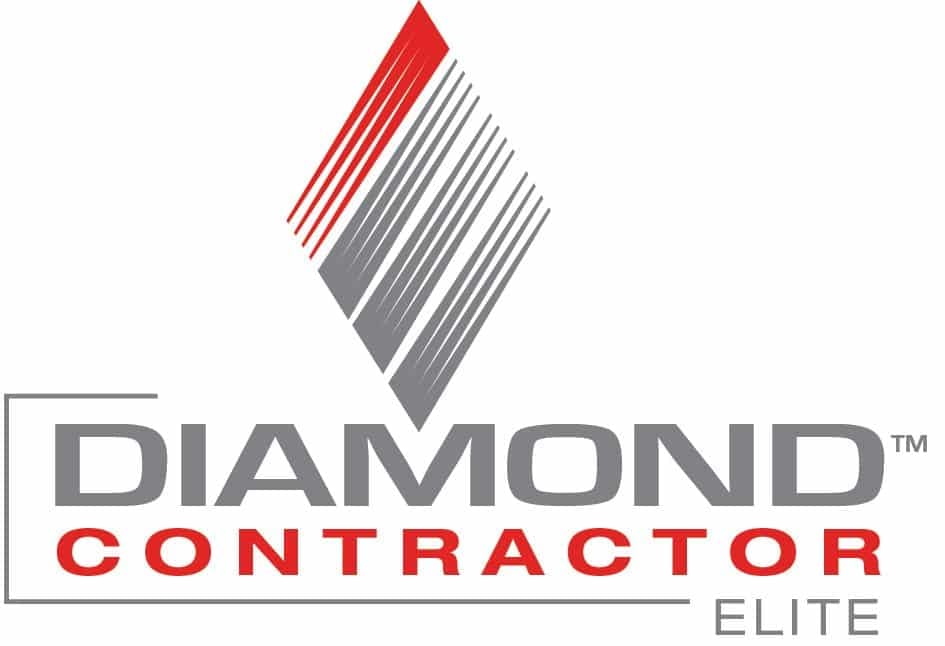
- Bonus rooms that are too hot to use all summer or too cold to use in winter.
- Historic homes where new ductwork would damage the integrity of the construction.
- Big family rooms that have hot or cold spots.
- Additions where your current ducted system can’t get the job done.
- Converted attics or basements that never feel comfortable.
- Rooms with large glass exposures.
- Bedrooms, especially master where your home comfort system just isn’t always getting it done.
- High utility bills.
Thanks again for visiting. We look forward to helping you with your home comfort needs!
85 Flagship Drive, Unit E
North Andover, MA 01845
Download the Hyper Heat Brochure
Download Your Ductless with Hyper Heat Product Guide Here
Improvements in ductless heat pump and cooling technology give New England homeowners complete flexibility when it comes to the comfort of your home and your family, achieving effortless comfort in temperatures as low at minus 13 degrees, with efficiency levels guaranteed to save you money on your utilities.
If you have any of these sounds like your situation, get our free guide to learn more about your options:
- Bonus rooms that are too hot to use all summer or too cold to use in winter.
- Historic homes where new ductwork would damage the integrity of the construction.
- Big family rooms that have hot or cold spots.
- Additions where your current ducted system can’t get the job done.
- Converted attics or basements that never feel comfortable.
- Rooms with large glass exposures.
- Bedrooms, especially master where your home comfort system just isn’t always getting it done.
- High utility bills.
Thanks again for visiting. We look forward to helping you with your home comfort needs!
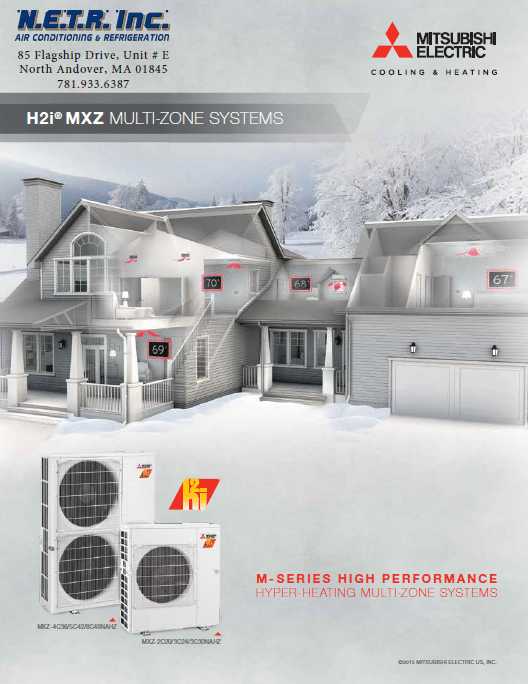

Download the Hyper Heat Brochure
Ductless Allergen Filtration
Mitsubishi Electric Cooling & Heating systems use a sophisticated multi-stage filtration system to help remove airborne particles and contaminants such as allergens, viruses, and bacteria from the air as they circulate within a room.
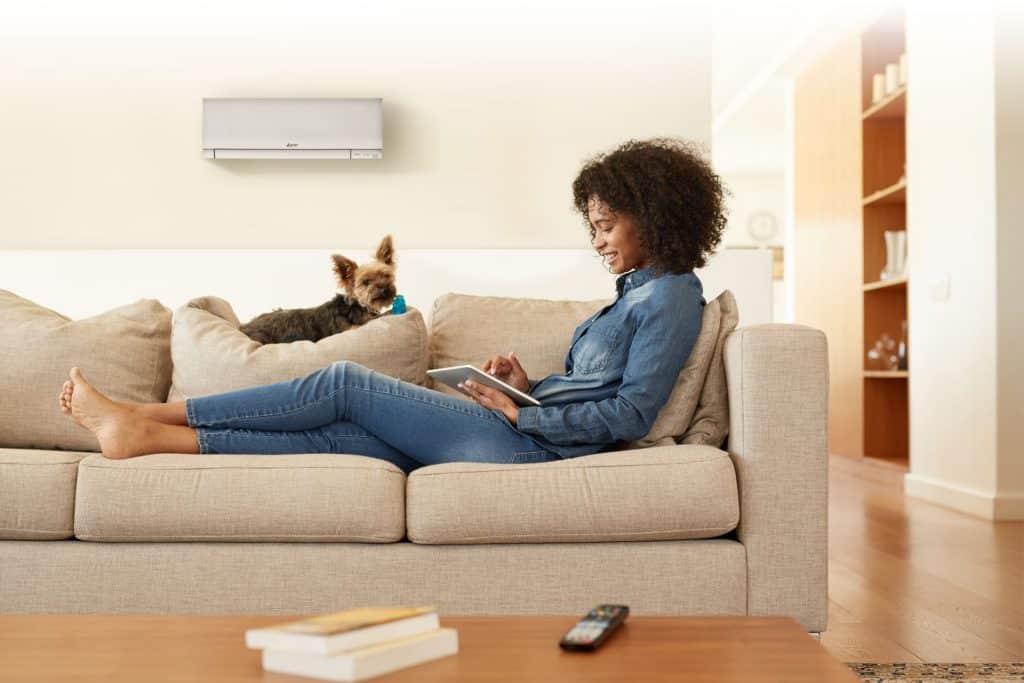
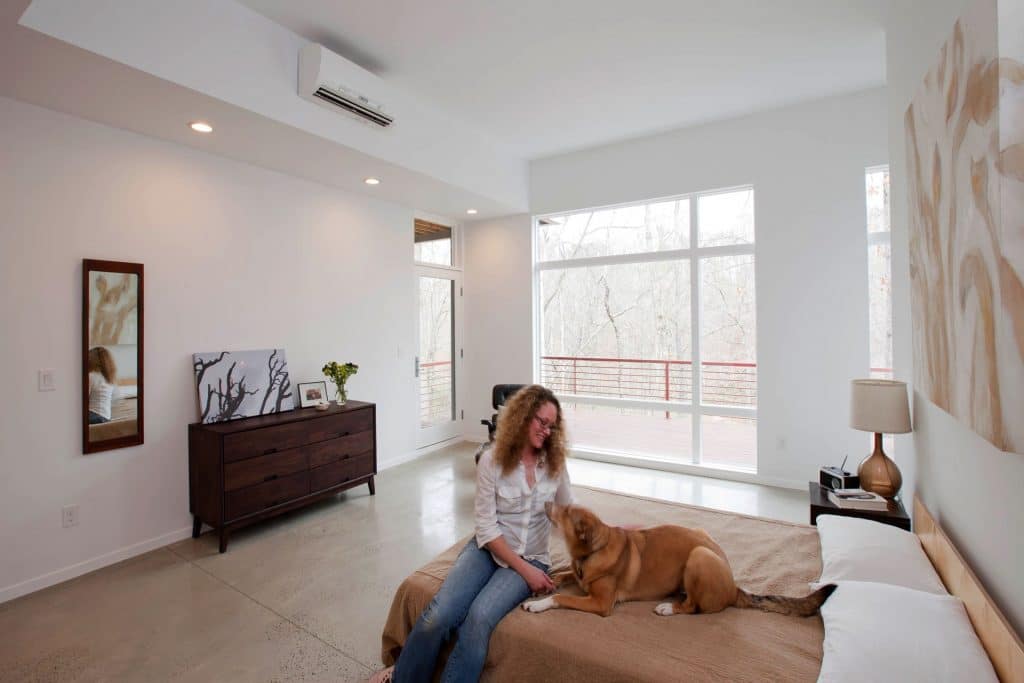
DUCTLESS INDOOR AIR QUALITY
It’s a fact that surprises many people. The air quality inside your home is often worse than the air quality outside. Mitsubishi Electric Cooling & Heating systems use a sophisticated multi-stage filtration system to help remove airborne particles and contaminants such as allergens, viruses, and bacteria from the air as they circulate within a room.
The large hybrid catechin pre-filter absorbs odor-causing gases. A blue-enzyme, anti-allergen filter helps reduce germs, bacteria, and viruses and helps trap dust, pollens, mites, and other particles that plague allergy sufferers. Some systems also include a Platinum Catalyst deodorizing filter to further reduce unpleasant odors. As a result you enjoy pristine air 24/7.
SUPER-EASY MAINTENANCE
Although the filtration system is sophisticated, it’s easy to clean and maintain. You can perform this task in a matter of minutes. Simply open the indoor unit’s filter access; slide the screens out; wash them off; allow them to dry completely, and then slide them back into the unit. With regular cleaning, the hybrid catechin filters can last up to 10 years. This capability not only saves money, but is also good for the environment.
AND MORE:
- Removes particulates and contaminants from the air with continuous fan operation for better air circulation
- Easy-to-clean hybrid catechin pre-filters absorb odors and last up to 10 years
- Anti-allergen filter traps dust, allergens and other particles to improve indoor air quality (IAQ)
- Platinum Deodorizing filter (select systems) uses nanotechnology for highly effective odor absorption
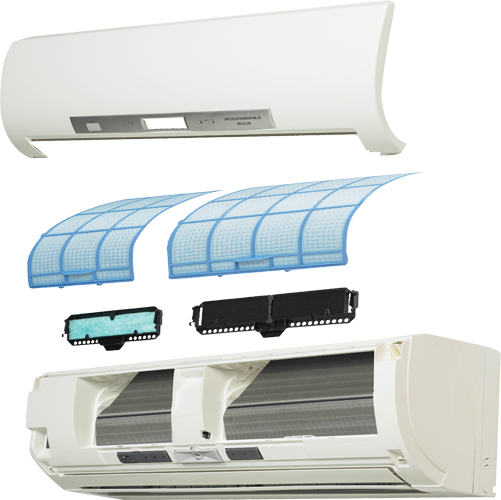
What an LG Ductless Mini-Split System Costs Around Boston, MA
Here in the Greater Boston area, ductless heating and cooling in a single zone configuration, fully installed and ready to turn on starts at $4,500 and the price goes up from there depending on a number of factors.
Buyer Beware
You may have found websites that claim it costs $1867 to purchase a new ductless mini split, and $159 to have it professionally installed. As you can imagine, that price is not only the cheapest, least efficient unit on the market, but I don’t know a contractor worth allowing into your home who would charge that little for labor. Proceed with caution.
READ: 7 Reasons to Choose Professional Installation for Your Heating and Cooling System
Ductless Mini-Splits are Whisper-Quiet
By now you may already know that ductless is a quiet, efficient heating and air conditioning solution for your home that will reduce your energy costs and in some cases, pay for itself in energy savings.
But, what can a homeowner expect to pay for this modern, convenient heating and air conditioning solution in the greater Boston area?
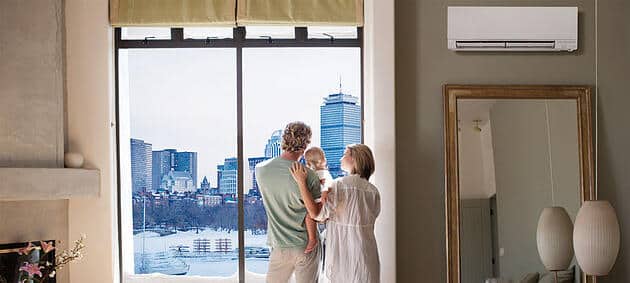
Ductless mini-split technology has been around for more than 50 years, but has only been available to New England homeowners for about thirty years.
In Japan, ductless accounts for 90% of all HVAC systems sold, and more than 80% in Europe.
Unfamiliarity with ductless technology and spotty access to educational information has slowed the growth of ductless acceptance in the United States, but the efficiency of ductless has caused major utility companies, government agencies and homeowners to take notice.
The financial incentives associated with ductless technology have made it one of the fastest growing home comfort solutions for residential heat pump and residential air conditioning replacements.
So, how much can you expect to pay to have a Mitsubishi ductless system installed in your home? Of course I’m going to tell you, it depends.
The price of a ductless system is determined by four primary factors:
- The size of the unit
- The type of unit
- The number of areas (or zones) being conditioned
- The degree of difficulty of the installation (How far the indoor and outdoor units are from each other, the construction of the outer wall to be drilled to carry the line sets, etc.)
Due to the flexibility of these systems (whole house, partial house, one room, etc.) there are multiple design possibilities that can slide your job from the lower end of the cost range to the highest. A ductless system, on its most basic level, consists of:
LG DUCTLESS INDOOR
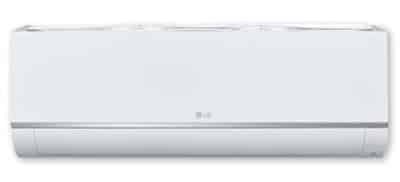
LG DUCTLESS OUTDOOR
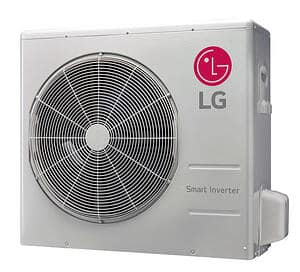
AND, LINE SETS TO CONNECT EVERYTHING
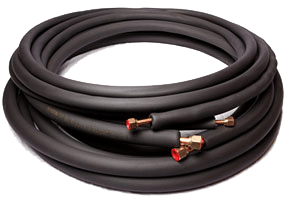
Single Zone Mitsubishi Ductless Installation
Professional installation of the most basic, or single zone, configuration (consisting of one wall unit and condenser) will cost between $3,500 up to $4,500. This layout is ideal for many kinds of applications like conditioning the air in a sunroom, garage, attic, and some smaller homes.
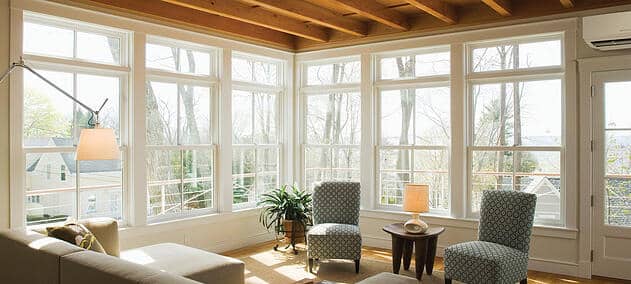
Multi-Zone Mitsubishi Ductless Installation
Some New England homeowners need only one ductless unit, while other applications are better served by 3, 4 or 5 units. It all depends on the layout of the home and what works best for you.
A multi-zone system consisting of two indoor evaporator units typically run between $8500 and $10,000.
We can run as many as five indoor units with a single outdoor condenser, and we can come back to add indoor units at a later date if you want to have your system designed for future expansion as budgets allow.
A 5-zone system could cost $20,000 to $28,000.
Is ductless a good value for my money?
At first glance, the cost of ductless heating and air conditioning can seem steep, however, the benefits in energy efficiency will save you a lot in the long run.
Since there are no ducts, you don’t waste energy through leaky ductwork.
Typical forced air systems experience duct losses equivalent to about 20% of the system’s energy consumption. Often it’s over 30%.
Ductless systems are also less expensive to maintain than traditional systems.
When you add in attractive rebate programs and 0% payment plans, ductless solutions wind up shaking out as a net cost savings to most homeowners.
A multi-zone configuration comes with an additional energy saving benefit. You can control the temperature independently in every room where an air handler is installed.
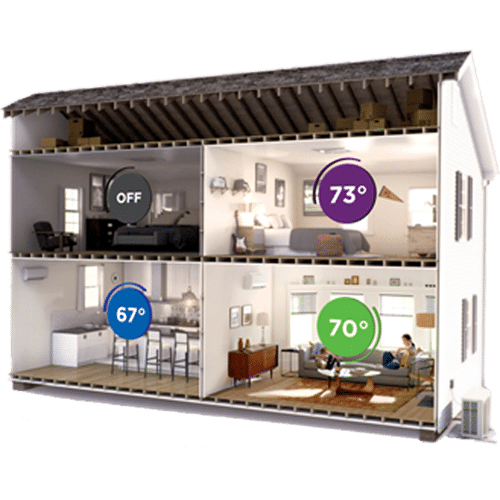
So, if you’re not using a room, you won’t have to keep it heated and cooled the same as the rest of the house.
Finally, you’ll need a qualified installer, like NETR, Inc., and, as I mentioned earlier, there are some good reasons for that (beyond the fact that it’s us. :-))
If you’re interested in ductless for you home, give NETR, Inc. a call at 781-933-6387, or click the button below to learn more and schedule an appointment.
MassSave Heating and Cooling Rebates
To encourage consumers to heat and cool their homes as efficiently as possible, MassSave offers a number of rebates on heating and cooling equipment. Trying to save money on HVAC equipment in Boston, MA? Then, check out these programs and follow the links to the MassSave website for more details.
Electric Heating and Cooling
If you invest in qualifying electric heating and cooling equipment in Massachusetts, you may be able to claim the following rebates:
- $50 per ton for central air conditioning.
- $250 per ton for a central heat pump.
- $250 per ton for a mini split heat pump.
- $1250 per ton for central or mini split gas or oil heat pumps (integrated controls required if not removing your central heating system) or for switching to an electric resistance heat pump that has at least a 900 kWh difference between the sum of your three winter usage and three lowest usage months.
- $500 per indoor unit, up to $1500 total for adding integrated controls to an existing central or mini split heat pump.
For more information, check out Mass Residential Electric Heating and Cooling Rebates
Gas Heating Equipment
MassSave offers rebates between $950 and $2,750 for eligible natural gas heating equipment including warm air furnaces, forced hot water boilers, and condensing boilers with on-demand hot water. The rebates vary based on the Annual Fuel Utilization Efficiency (AFUE) rating of the equipment, and as a general rule of thumb, your rebate increases when you buy more efficient equipment.
Visit, MassSave Natural Gas Heating Equipment to learn more.
Oil Heating Equipment
If you buy an oil-powered furnace with an electronic commutated motor (ECM) and a minimum AFUE of 86%, you can earn a $650 rebate from MassSave. Similarly, a hot water boiler with a minimum 86% AFUE earns you an $800 rebate.
To find out more, go to Mass Residential Rebates for Oil Heating Equipment.
Propane Heating Equipment
For a propane furnace with an ECM motor and a minimum 95% AFUE rating, the rebate is $1,000. You can earn a $1,500 rebate for a hot water boiler with a 90% AFUE, or bump the rebate up to $2,300 by upgrading to a boiler with at least a 95% AFUE. Finally, a condensing boiler with an on-demand water heater and at least a 95% AFUE rating brings in a $2,000 rebate.
Learn more at Propane Heating Equipment Rebates
Electric Heat Pump Water Heaters
In addition to lowering your utility costs, a heat pump water heater with 55 gallon or smaller tank can earn you a $600 rebate, while larger tanks can earn you a $150 rebate. To qualify, small tanks must have a uniform energy factor (UFE) of 2.0 while larger tanks must have at least a 2.7 UFE.
Get more details on how to apply for rebates at Mass Residential Electric Heat Pump Water Heater Rebates
Natural Gas Water Heaters
Prefer heating your water with natural gas? MassSave offers the following rebates:
- $700 for an Energy Star certified on-demand tankless water heater with an UEF of .87 or greater
- $100 for an Energy Star certified storage water heater with a UEF of .64 or greater on medium draw and a UEF of .68 or greater on high draw.
- $500 for an Energy Star certified condensing gas water heater with UEF of .80 or greater.
- $400 on an indirect water heater connected to a natural gas forced hot water boiler.
Go to Mass Residential Natural Gas Water Heaters for more info.
Oil Water Heaters
The potential savings continue when you invest in an indirect oil water heater attached to an oil-fired heating system. If you replace a freestanding or tankless water heater, you can earn a $800 rebate, but unfortunately, solar storage tanks are not eligible.
Check out Oil Water Heater Rebates for more details.
Propane Water Heaters
You can also earn a $400 rebate when you replace a freestanding or tankless water heater with a high-efficiency indirect propane water heater, but again, solar storage tanks are not eligible. To double your rebate to $800, look for an Energy Star certified on-demand tankless propane water heater with an electronic ignition and at least a .87 Energy Factor (EF) or higher.
To learn how to apply for rebates, check out Propane Water Heater Rebates.
Smart and Programmable Thermostats
Smart thermostats let you preset your thermostat and control your home’s temperature remotely, helping to save energy and reduce your utility bills. For 7-day programmable thermostats, you can earn $25 per thermostat on up to four thermostats. The rebate for an Energy Star certified smart thermostat is $100 each for up to four thermostats.
Check out Smart & Programmable Thermostats for more info.
Keep in mind that these programs change frequently. For the most up-to-date information or to learn about the best HVAC equipment for your situation, contact us today. At N.E.T.R., Inc, we have been providing heating and cooling installation, repairs, and service to homes and businesses in the greater Boston area for years, and we look forward to working with you.



